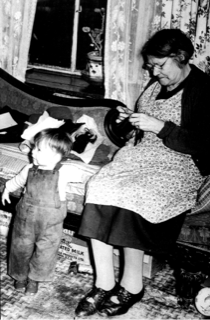This short and lively chat is an interesting window on a simpler way of life for women who formed bonds in the community through their work in glove-making.
Interviewed in her Fulbrook home, Mrs Newman starts by answering a few questions about her early life in her village. Born in 1902, she especially mentions the size of families living in small cottages during those early years, and the size of classrooms in local schools, augmented by the children of farmworkers. Starting ages for children would depend on available capacity in the classrooms.
She lived in the middle of the village initially, and subsequently moved to a cottage on the Burford Road, and speaks of a Jack Smith, and of a Mrs Wheeler living nearby.

After these general comments on village life, the rest of the interview takes up Mrs Newman’s work as a glovemaker, talking about the varying styles from rough to sophisticated. She highlights that some of her work was made for King George V – a glove with a special pattern. She describes how the gloves were taken to Burford for processing, and talks about the piece rate, the different styles and the strict deadlines.
The importance of this work for mothers with children is clear in her memory, and the support of the younger women for the elderly women with weaker eyesight was important also.
She remembers the weekly meetings in the reading room in the village, organised by the vicar’s sisters, where women could meet, do their glove work and listen to book readings, before, of course, the advent of the radio.
DB Oct 2023

